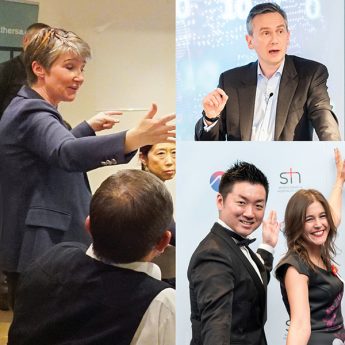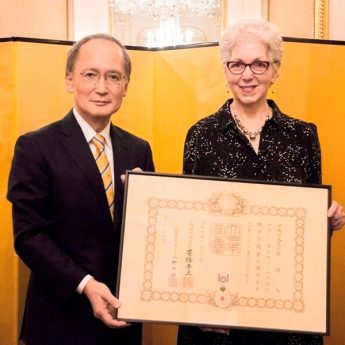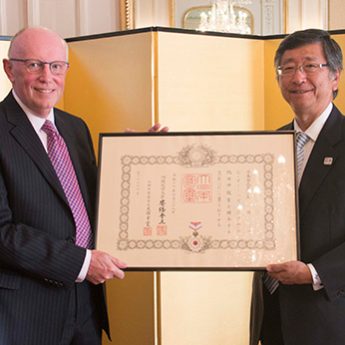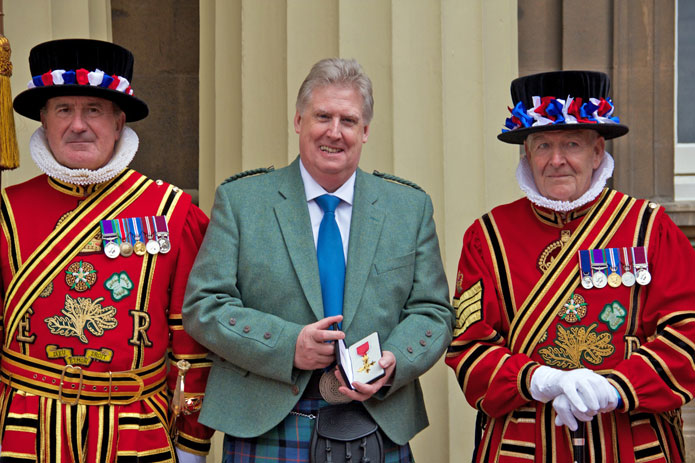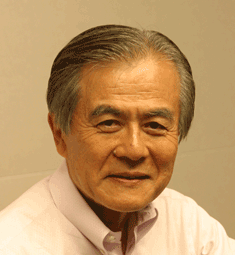- Invented the Web in 1989
- Argues Web should be free and decentralised
- Needs international system to tackle security and privacy issues that have arisen
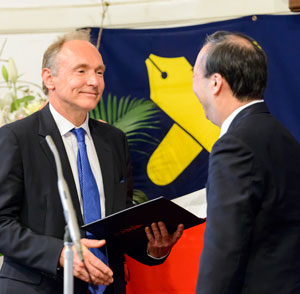
Sir Timothy Berners-Lee receives his honorary degree.
The world was set on the path to becoming an information society in 1989, when Sir Timothy Burners-Lee invented the Web. And now he has been awarded the degree of Doctor of Media and Governance, honoris causa, by Keio University. This follows a knighthood by Queen Elizabeth II in 2004 and the first Queen Elizabeth Prize for Engineering in 2013.
“The invention of the Web has enabled people to access information, create ideas, buy and sell products and socialise with friends at previously unimaginable speeds and scale”, Jun Murai, dean of the faculty of Environment and Information Studies, said in his citation for Sir Timothy.
“We all recognise that the Web has changed our lives and changed how industries operate. It has led civilisation into a new era of the Internet”.
It was in 1994 that Sir Timothy founded the World Wide Web Consortium (W3C) after having just started his career at the Massachusetts Institute of Technology Computer Science and Artificial Intelligence Laboratory. In 1996, the Japanese branch of the W3C, its third host branch, was established at Keio University.
“It plays an important role in bridging industry, academia and government, as well as in serving as a gateway to the Asian community”, Murai said, addressing Sir Timothy’s development of close relations with Japanese and Keio University Researchers.
Speaking at Keio University on 14 March, Sir Timothy gave a commemorative lecture, in which he reflected on where the Internet and the Web began and what the future may hold. In particular, he advocated the importance of human rights and privacy on the Web.
Dialling up
Sir Timothy recalled the complexity of sharing information during his time working at CERN, the European Organization for Nuclear Research, in Geneva in 1980, which is when the idea of the web first came to him. With staff from a number of countries and universities, a wide range of computers and programs was being used. Since this created complications in distributing data, a way to share information more effectively was needed.
But it was sometime before Sir Timothy could properly begin work on the project. In 1989, he proposed his idea of linking hypertext with the Internet to his then-manager, Mike Sendall, who famously described it as “vague but exciting”. Using the Steve Jobs-designed NeXT computer, Sir Timothy built a programme that would become the World Wide Web.
“I built the first web browser, it was actually an editor. So it was not just to read information—you could make links, and I could connect it up to the Internet”, he explained, emphasising that, at the time, “the Internet was a permission-less base”.
For this reason, Sir Timothy strongly supports the Internet being open and decentralised.
“The Internet doesn’t discriminate, it just allows you to use any application, allows you to talk to any other website, without discrimination, hopefully”, he added.
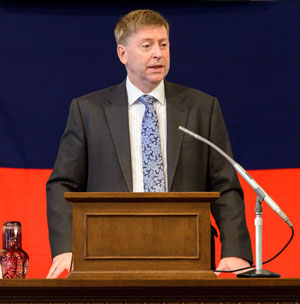
UK Ambassador to Japan Paul Madden CMG spoke at the event.
The Web, he said, is now being used as a layer, upon which social networks such as Twitter and Facebook are being built. He noted that these social networks are centralised, which goes against the original intention behind the World Wide Web.
“The Web was so exciting because it was decentralised, anyone could start something new on the Web”, he explained.
In particular, he mentioned fake news and hate-filled dialogue that is increasingly making its way into social media.
“[We] really [need to] think about the social systems that we build when we build social networks”, he said. “You don’t want to make a machine that tries to censor out untruths, but you do want to make a machine which censors out people being unconstructive in their discourse”.
In particular, he referred to some countries where “[the Web] is designed as a platform, but actually there is a boundary put around people in a particular country by the government”. This removes the freedom of use for which it was designed.
Citing the Investigatory Power Bill that was passed in the UK last year, Sir Timothy described how security services could now “spy” on all interactions by users, something he believes is an infringement of privacy.
“That breaks the moral of the Web being a neutral thing”.
He suggested that to meet changing needs in the type and amount of information, a system must be created across international borders that can both tackle security flaws and manage data without privacy infringement.
Sir Timothy explained that social platforms and systems play a considerable role in creating this safer, yet more decentralised system, and that they are of significance in the political world, too.
“Why don’t we look at social systems we can build on the web as building better democracies?” he asked.
“We have to look at society … and look at governments and how people make decisions in towns and villages, how people make decisions in countries”, he said.
“[We must] take the whole scientific system and build and use technology to create new systems to make that more open, more effective, to make it work a better way”, he added. “Then if you can do that for science, you can do that for democracy too”.


